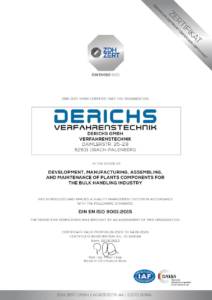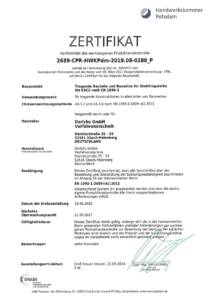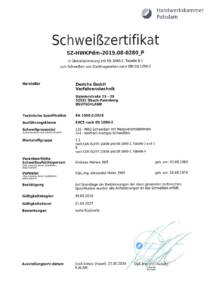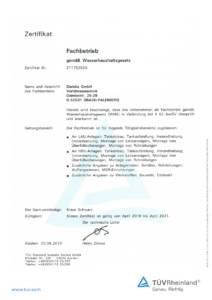Certified quality
We accept the challenge of the market for higher quality standards of products and service.
The work environment that is created by us gives every employee the opportunity to be motivated and committed to these requirements – because only through the contribution of each individual it is possible to pass error-free work results to the customer and thus contribute to the quality assurance of our products.
The certification “welding specialist” according to DIN/ISO 1090-2 and the certification according to DIN EN ISO 9001 confirm what has been for us since 1818 naturally:
Quality-oriented work of motivated, well-trained craftsmen in constant fair play with progress and technology.
In accordance with the requirements of quality assurance, some of our components are designed according to EC-type examination certificate, directive 94/9 / EC, certified as safety protection system. The certification according to DIN EN ISO 9001 was extended by the certification “quality assurance production” (FTZU 05 / ATEX Q / 011).
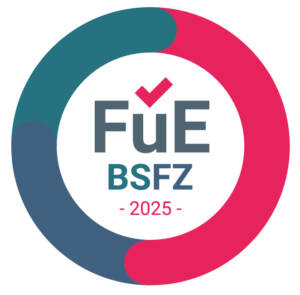
BSFZ seal confirms the innovative strength of Derichs
Derichs has been awarded the exclusive BSFZ seal by the Federal Ministry of Education and Research. This seal is awarded to companies that have received at least one positive certificate for their research and development (R&D) activities from the BSFZ. The year indicated on the seal marks the year in which the certificate was issued and underlines the company’s internal R&D performance.
The BSFZ seal is proof of our innovative competence in plant engineering and documents Derichs’ continuous developments aimed at sustainability, future viability and technical excellence.
Background to the research allowance
Since January 1, 2020, the Act on Tax Incentives for Research and Development (FZulG) has provided financial incentives for R&D expenditure for companies in Germany – regardless of their size, legal form or industry. The aim of this law is to strengthen Germany as a research location and to motivate small and medium-sized companies in particular to innovate.
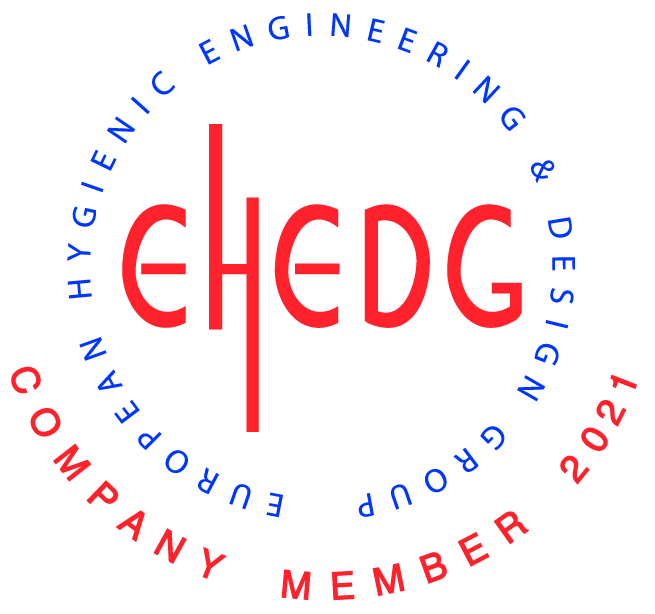
Derichs is an EHEDG member – for more safety in food production
As an active member of the European Hygienic Engineering and Design Group (EHEDG), Derichs is committed to meeting the highest hygiene standards in the food industry. The aim is to minimize potential hygiene risks and thus ensure consumer safety.
We meet the strictest hygiene requirements for use in plant construction and support our customers in making their processes safe and efficient.
What is the EHEDG?
The European Hygienic Engineering and Design Group is an international association of experts, companies and institutions dedicated to improving hygiene in food production. Since its foundation in 1989, the non-profit organization has been committed to safe food by optimizing hygiene standards at all stages of production.
With over 1,300 members from more than 55 countries, including equipment manufacturers such as HBM, food producers, research institutes and government authorities, the EHEDG promotes knowledge transfer and supports compliance with legal requirements.
Tasks of the EHEDG
The EHEDG unites industry, research and legislation in order to sustainably improve the quality and safety of food. Working groups develop practical guidelines based on EU hygiene directives such as EN 1672-2, EN ISO 14159 or EC Directive 2006/42/EC.
These guidelines provide comprehensive instructions on the hygienic design, installation and maintenance of production facilities. The aim is to minimize contamination risks and ensure optimum cleanability. EHEDG test procedures and certificates guarantee compliance with European hygiene standards and provide additional security for companies using certified products.
The EHEDG regularly organizes training courses and member congresses to promote further training and exchange.
EHEDG guidelines at a glance
The EHEDG guidelines place particular emphasis on easy maintenance, optimized cleaning and the use of suitable materials. Some of the central principles are
Use of food-compatible, corrosion-resistant materials
Smooth, non-porous surfaces without gaps or cracks
Flow-optimized component geometries to avoid dead zones
Designs that can be cleaned without disassembly (cleaning-in-place, CIP) Good accessibility and easy maintenance
Source: EHEDG (European Hygienic Engineering & Design Group)

